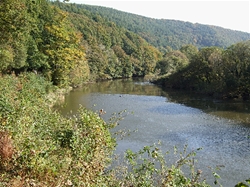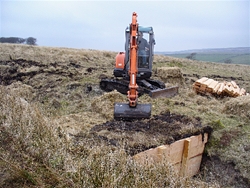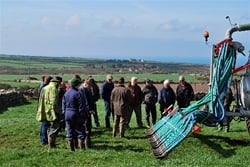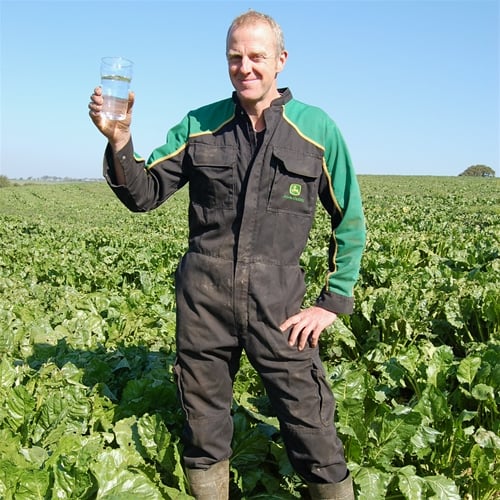New Upstream Thinking programme to protect rivers
20th October 2015
The multi-award-winning Upstream Thinking partnership is expanding work to improve water quality in the region's rivers with a new five-year programme.
A partnership of South West Water, the Devon Wildlife Trust, the Cornwall Wildlife Trust, the Westcountry Rivers Trust and the Exmoor National Park Authority is building on work begun in 2008 to change land management practices to protect rivers.
Supported by the National Farmers Union, the Environment Agency, Natural England and the Farming and Wildlife Advisory Group, the programme is part of South West Water's long term business plan to reduce its environmental footprint and manage the impact of diffuse pollution on customers' bills.
The programme has two main elements: advice and grants for farmers and the restoration of peatland in partnership with landowners.
The latest £11.8 million programme focuses on 11 catchments across Devon and Cornwall in 2015-20. The target for the programme is 750 farms and 1,300ha of moorland and other semi-natural land under revised management.

Upstream Thinking advisers will be working on the Exe, the Dart, the Otter and the Yeo in Devon plus groundwater sources in East Devon and the catchment around Fernworthy Reservoir, while in Cornwall they will be focusing on the Cober, the Tamar, the Falmouth reservoirs and Drift reservoir.
Grants are targeted at farms with land connected to rivers above water abstraction points. The aim is to reduce the amount of unwanted substances in river water, which in turn helps to control the cost of chemicals and energy needed to turn raw water into high quality tap water.
South West Water Programme Manager, Dr David Smith, said: "We rely on our rivers, reservoirs, aquifers and moorland for our water supply and this vital resource can be significantly affected by the decisions made by landowners in the surrounding area.
"Just one tiny capful of pesticide can still be detected in river water 30kms downstream so we are working with farmers to improve pesticide storage and use, as well as other improvements that will keep things like slurry, nutrients and pollutants out of water courses.
"Upstream Thinking is a sustainable approach, working with the expertise of partners, the knowledge of farmers and nature itself to improve water quality. This keeps down costs for our customers and reduces the impact of water treatment on the environment, as well as providing better homes for wildlife."
Grants can help to fund improvements to slurry storage, fencing to keep livestock out of rivers, providing alternative water sources for livestock, better pesticide management including investment in new equipment, such as weed wipers which deliver targeted doses of herbicide.
Farmers match the funding and often invest more besides, as well as being able to access further sources of funding. Farmers who took part in the programme in 2010-2015 saved an average of £20,000 on things like reduced fertiliser costs.
Since 2008 Upstream Thinking advisors have made 1,700 visits to farms and allocated 180 capital grants totalling £2.2million.

The moors of the South West provide over 40 per cent of our drinking water, and peatland restoration is a crucial element of the Upstream Thinking programme. The Exmoor Mires Partnership has investigated and restored over 2,000 hectares of moorland on Exmoor and Dartmoor, and plans to restore a further 1,000 hectares by 2020.
Scientific research carried out on the moor by the University of Exeter has shown that restored bogs release a third less water during storms and 30% less dissolved organic carbon, which discolours the water. Research by the Environment Agency suggests the work is helping to maintain river levels during drier summer months.

Paul Cottington, Environment Adviser for the National Farmers Union in the South West, said: "Farmers across the South West are recognising that the land they farm provides multiple services for society, including clean water, and they are investing time and money in measures like these that will help protect water sources for the future."
Cheryl Marriott, Conservation Manager for Cornwall Wildlife Trust said: "The beauty of the Upstream Thinking approach is that it delivers multiple benefits: the projects we host seek to enhance wildilfe habitats and improve water quality whilst also reducing farmers' costs. This plays a key role in the programme's success."
Harry Barton of the Devon Wildlife Trust said: "What's good for water is good for wildlife. Here in the South West we are lucky to have a really good alliance working together to make a step-change in the health of the major river catchments in our region."
Ends
Case study

Cornish farmer Andrew Jones from Higher Trevallett Farm near Launceston was awarded a £75,000 Upstream Thinking grant in 2013 after an assessment by the Westcountry Rivers Trust. The money, which Andrew matched, went towards building a new covered slurry store for his dairy heifers. The tank is immediately below the barn where the cows are housed and provides five months' storage where previously he had space for just a month's slurry. "It's a big weight off my mind," Andrew said, "I can sleep easy at night knowing that the slurry store is not going to overflow and I can spread the nutrients on the land at the optimum time so that it stays on the land and doesn't run into the rivers. It means we can wait for exactly the right conditions before we spread." Senior Farm Adviser Ross Cherrington from the WRT says they have recorded an increase in varieties of invertebrates suggesting an improvement in water quality in the nearby River Kensey, which flows into the Tamar above South West Water's raw water intakes at Gatherleigh and Gunnislake.
Ends
Published: 20 October 2015
For further information please contact:
Press Office
South West Water
www.southwestwater.co.uk/contactus
